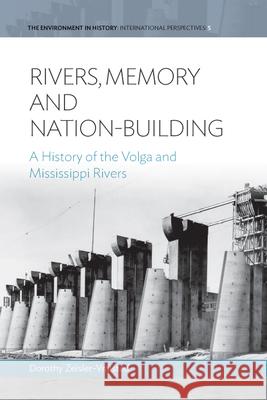Rivers, Memory, and Nation-Building: A History of the Volga and Mississippi Rivers » książka
Rivers, Memory, and Nation-Building: A History of the Volga and Mississippi Rivers
ISBN-13: 9781782384311 / Angielski / Twarda / 2014 / 204 str.
"The main themes and insights are strong ones...As well as offering a worthy and inspired comparison, this is a genuine and systematic comparison with a clear structure and steadily building momentum: a good balance is struck between the two rivers and the author frequently alternates between them, but without confusing the reader." - Peter Coates, The University of Bristol "This is a concise and convincing comparative discussion of two major rivers. It is clearly shown that political systems were less important than the overarching twentieth century idea of modernization...Harnessing rivers for a free world was a common view - different ideas of 'freedom' may have existed, but the rivers were to be harnessed in strikingly similar ways. The comparative approach of the book, supported by appropriate details of each river and projects, allows for pointing out the main issues, questions and evidence, and shows how alike the two opposing political systems were when it came to river development." - Maurits Ertsen, Delft University of Technology Rivers figure prominently in a nation's historical memory, and the Volga and Mississippi have special importance in Russian and American cultures. Beginning in the pre-modern world, both rivers served as critical trade routes connecting cultures in an extensive exchange network, while also sustaining populations through their surrounding wetlands and bottomlands. In modern times, "Mother Volga" and the "Father of Waters" became integral parts of national identity, contributing to a sense of Russian and American exceptionalism. Furthermore, both rivers were drafted into service as the means to modernize the nation-state through hydropower and navigation. Despite being forced into submission for modern-day hydrological regimes, the Volga and Mississippi Rivers persist in the collective memory and continue to offer solace, recreation, and sustenance. Through their histories we derive a more nuanced view of human interaction with the environment, which adds another lens to our understanding of the past. Dorothy Zeisler-Vralsted is Professor of Government and International Affairs at Eastern Washington University. Her research in rivers and water resources has been published by UNESCO, Environment and History, as several book chapters, and in numerous regional journals. Prior to her academic research, she worked in the public sector in water rights and researched and consulted for water rights litigation.
"The main themes and insights are strong ones...As well as offering a worthy and inspired comparison, this is a genuine and systematic comparison with a clear structure and steadily building momentum: a good balance is struck between the two rivers and the author frequently alternates between them, but without confusing the reader." · Peter Coates, The University of Bristol"This is a concise and convincing comparative discussion of two major rivers. It is clearly shown that political systems were less important than the overarching twentieth century idea of modernization...Harnessing rivers for a free world was a common view - different ideas of freedom may have existed, but the rivers were to be harnessed in strikingly similar ways. The comparative approach of the book, supported by appropriate details of each river and projects, allows for pointing out the main issues, questions and evidence, and shows how alike the two opposing political systems were when it came to river development." · Maurits Ertsen, Delft University of TechnologyRivers figure prominently in a nations historical memory, and the Volga and Mississippi have special importance in Russian and American cultures. Beginning in the pre-modern world, both rivers served as critical trade routes connecting cultures in an extensive exchange network, while also sustaining populations through their surrounding wetlands and bottomlands. In modern times, "Mother Volga" and the "Father of Waters" became integral parts of national identity, contributing to a sense of Russian and American exceptionalism. Furthermore, both rivers were drafted into service as the means to modernize the nation-state through hydropower and navigation. Despite being forced into submission for modern-day hydrological regimes, the Volga and Mississippi Rivers persist in the collective memory and continue to offer solace, recreation, and sustenance. Through their histories we derive a more nuanced view of human interaction with the environment, which adds another lens to our understanding of the past.Dorothy Zeisler-Vralsted is Professor of Government and International Affairs at Eastern Washington University. Her research in rivers and water resources has been published by UNESCO, Environment and History, as several book chapters, and in numerous regional journals. Prior to her academic research, she worked in the public sector in water rights and researched and consulted for water rights litigation.











